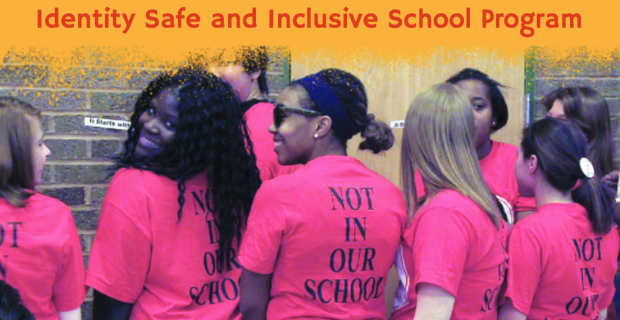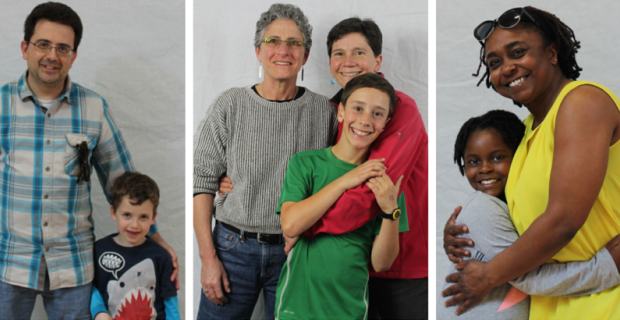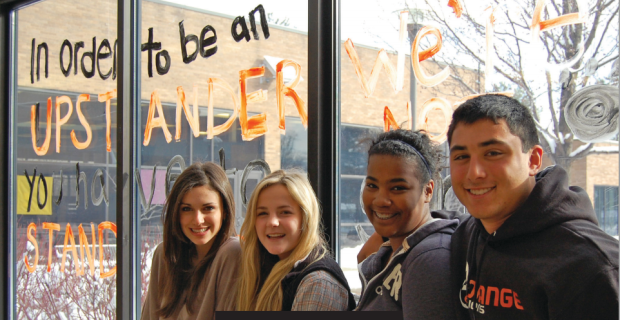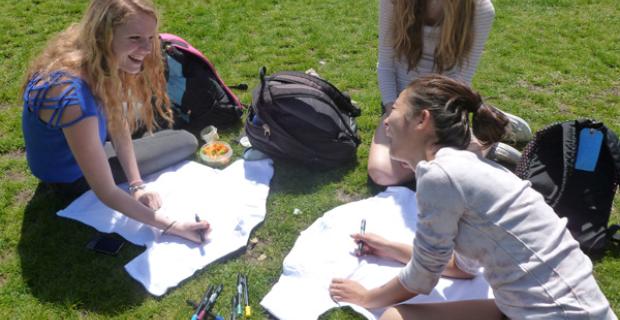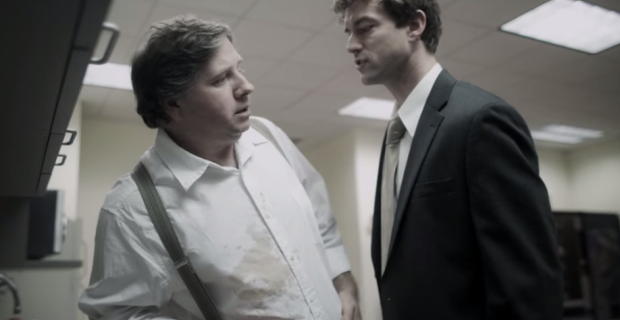Not in Our School
About NIOS
Not In Our School is a program that creates safe, accepting and inclusive school communities. Not In Our School provides training, films, lesson plans and resources that inspire students to take the lead in standing up to bullying and intolerance in their schools.
Find Lesson Plans
-
In this new video geared toward elementary schools, students from Grimmer Elementary School in Fremont, CA explore the impact of bullying and...
-
Waking in Oak Creek: A Community Rocked by Hate is Awakened and Transformed As the Sikh community in Oak Creek, Wisconsin prepares for Sunday...
-
Download the full lesson guide that accompanies Our Family. Background: Families in the United States today come in many different types...
-
Este video destaca una actividad interactiva llamada “Disolviendo estereotipos.” Se puede usar de manera efectiva con alumnos o adultos...
-
En este video los estudiantes de Grimmer Elementary School en Fremont, California exploran el impacto del acoso escolar o “bullying” y...
-
Estudiantes líderes de la escuela secundaria Del Sur en Lancaster, California visitan una escuela primaria local y enseñan a...
-
Grade Level: Elementary grades K-5 Film Run Time: 4:51 En Español: Inténtenlo: Representación Anti-Acoso Escolar ...
-
Find previews and information about Class Actions at niot.org/ClassActions Written by: Julie Mann, Newcomers High School...
-
Description: This video provides a brief overview of the purpose and goals of NIOS. It includes brief interviews with Patrice O’Neill,...
-
Students at Watchung Hills Regional High School in New Jersey were fascinated when they heard about an Orange Out against bullying in...
-
Waking in Oak Creek: A Community Rocked by Hate is Awakened and Transformed As the Sikh community in Oak Creek, Wisconsin prepares for Sunday...
-
This video highlights a powerful activity called Dissolving Stereotypes. This activity can be used effectively with students or adults to explore...
-
The Public Service Announcement (PSA), “Break Bullying,” depicts adults in an office environment re-enacting the director’s personal bullying...
-
Creado por Facing History and Ourselves Resumen En esta lección se explora el video “Los estudiantes mapean las zonas de bullying para...
-
Creado por Facing History and Ourselves Resumen En esta lección se explora el video corto “Nadie nace ilegal”, mediante estrategias...
-
Created by Facing History and Ourselves Esta lección también está disponble en español. Overview In this lesson idea,...
-
The students profiled in this video acted as documentarians for their local community and its changing demographics, attitudes and experiences. The...
-
From Facing History teacher Julie Mann, who is screening the full-length documentary Not In Our Town: Light in the Darkness with her students at...
-
Created by Facing History and Ourselves Overview In this lesson idea, the short video “New Immigrants Share Their Stories” is explored...
-
If interested in modeling this dialogue in your own classroom, please use the following guidelines to assist in ensuring a positive and productive...
-
Waking in Oak Creek: A Community Rocked by Hate is Awakened and Transformed As the Sikh community in Oak Creek, Wisconsin prepares for Sunday...
-
This video highlights a powerful activity called Dissolving Stereotypes. This activity can be used effectively with students or adults to explore...
-
The Public Service Announcement (PSA), “Break Bullying,” depicts adults in an office environment re-enacting the director’s personal bullying...
-
Julie Mann is a teacher at Newcomers High School in NYC. When she saw the Not In Our Town Video, Charleston, The Days After, and the...
-
Creado por Facing History and Ourselves Resumen En esta lección se explora el video “Los estudiantes mapean las zonas de bullying para...
-
Creado por Facing History and Ourselves Resumen En esta lección se explora el video corto “Nadie nace ilegal”, mediante estrategias...
-
Created by Facing History and Ourselves Esta lección también está disponble en español. Overview In this lesson idea,...
-
While the students profiled in this video had a catalyst prompting them to hold a community anti-hate rally, this is not necessary to engage students...
-
The students profiled in this video acted as documentarians for their local community and its changing demographics, attitudes and experiences. The...
-
From Facing History teacher Julie Mann, who is screening the full-length documentary Not In Our Town: Light in the Darkness with her students at...
-
Download the full lesson guide that accompanies Our Family. Background: Families in the United States today come in many different types...
-
Julie Mann is a teacher at Newcomers High School in NYC. When she saw the Not In Our Town Video, Charleston, The Days After, and the...
-
Creado por Facing History and Ourselves Resumen En esta lección se explora el video corto “Nadie nace ilegal”, mediante estrategias...
-
Creado por Facing History and Ourselves Resumen En esta lección se explora el video “Los estudiantes mapean las zonas de bullying para...
-
Estudiantes líderes de la escuela secundaria Del Sur en Lancaster, California visitan una escuela primaria local y enseñan a...
-
Este video destaca una actividad interactiva llamada “Disolviendo estereotipos.” Se puede usar de manera efectiva con alumnos o adultos...
-
En este video los estudiantes de Grimmer Elementary School en Fremont, California exploran el impacto del acoso escolar o “bullying” y...
-
"We are all Americans in this country." —Fred Korematsu (1919-2005) When Japanese-Americans were sent to camps during World War II,...
-
Alex Epstein is a college student who, during high school, was compelled to help rebuild New Orleans after Hurricane Katrina. Using the...
-
Janet Miller, a teacher at Hoover Middle School, said that she was blown away by district-wide statistics that revealed the risk of...
-
The son of Filipino immigrants, Laurence Tan was studying to be a doctor when the vision of becoming a teacher presented itself in a dream. Now a fifth grade teacher in Watts, CA, Laurence uses the tool of TEACH to inspire and educate students in an area where opportunities are slim. Laurence has also helped establish the Watts Youth Collective with former students, an organization that promotes social change through media. Laurence’s 12-hour teaching days and his work with the collective are efforts to produce positive changes in each individual and the community.
-
En este video los estudiantes de Grimmer Elementary School en Fremont, California exploran el impacto del acoso escolar o “bullying” y modos de ser una persona que defiende a las víctimas del acoso escolar o de ser un Defensor o “Upstander”.
-
Gunn High School in the Palo Alto Unified School District has held a Not In Our School campaign at their school for nearly a decade. The objective of the weeklong campaign is to “promote acceptance, awareness and identity within the PAUSD community” and “to help the Gunn community increase understanding and encourage discussion about the diversity and race relations Gunn.”
-
The Public Service Announcement (PSA), “Break Bullying,” depicts adults in an office environment re-enacting the director’s personal bullying experience from middle school. His point: If we would not stand for this in the office, why do we stand for it happening to kids in schools?
-
In this new video geared toward elementary schools, students from Grimmer Elementary School in Fremont, CA explore the impact of bullying and ways to be an upstander.
-
Este video destaca una actividad interactiva llamada “Disolviendo estereotipos.” Se puede usar de manera efectiva con alumnos o adultos para explorar experiencias que han tenido en relación con los estereotipos y palabras hirientes, así como formas para “disolver” el daño causado.
-
From Facing History teacher Julie Mann, who is screening the full-length documentary Not In Our Town: Light in the Darkness with her students at Newcomers High School in Queens, NY. There are two documents. The first begins discussion using several short clips available on NIOT.org: the Light in the Darkness trailer, Joselo's Journey Part 1, Raising the Curtain on Unity and Embracing Differences, all of which can be found here.
-
The video, "Lancaster, California: A City United to End School Bullying," profiles students, educators and community members working to create change after two teen suicides, resulting from bullying, devastate two nearby towns. In the aftermath, a local middle school counselor initiates an anti-bullying program throughout the district and students take the lead in standing up to bullying and intolerance in their schools and community.
-
Palo Alto High School student Kevin Ward challenges the stereotype of African-Americans as "gangsters," and says that "smart is the new gangster." The 16-year-old is working to bridge the achievement gap for students of color, through the school's Unity Club and a program called Bridge, connecting students from affluent Palo Alto and East Palo Alto, a neighboring low-income community. This lesson addresses the following SEL strategies. You can have students look for these issues and examine them in themselves.
-
-
Download the full lesson guide that accompanies Our Family. Background:
-
Engaging students in dialogue about prejudice and discrimination is a very powerful tool in combating hate and bullying and ensuring respectful classrooms and schools. Such dialogues can be led by classroom teachers, school social workers or counselors, or by other students trained to lead and facilitate dialogue. Having students view the “Students Tune In and Speak Out” video to begin such a dialogue is an effective way to open this process.
-
In this video, students use role-playing scenarios to depict experiences with prejudice or name-calling and practice effective interventions to combat or stop the bullying or harassment. This process can be an effective tool to use with students in your own classroom and school. Please use the guidelines below and review the “Note of Caution” to ensure a positive and productive experience. This lesson is part of the Not In Our School Video Action Kit, a comprehensive toolkit featuring films, lessons, and resources designed to motivate students to speak out against bullying, and create new ways to make their schools safe for everyone.
-
The students profiled in this video acted as documentarians for their local community and its changing demographics, attitudes and experiences. The students used this data to inform their efforts to promote mutual respect and equality in their school. Providing students with the opportunity to research and explore the history of civil and social justice issues in their own communities can be a powerful tool for learning and reflection.
-
If interested in modeling this dialogue in your own classroom, please use the following guidelines to assist in ensuring a positive and productive discussion. This lesson is part of the Not In Our School Video Action Kit, a comprehensive toolkit featuring films, lessons, and resources designed to motivate students to speak out against bullying, and create new ways to make their schools safe for everyone. Age-level: middle and high school students
-
In this video, students created an assembly performance that included individual presentations, role-playing scenarios and musical performances. Any or all of these efforts represent exciting and creative ways for students to contribute their voice and perspectives to important social justice issues. As this is a big undertaking, please review the following guidelines to assist in your planning and implementation.
-
As a result of the murder of Marcelo Lucero, there were many positive efforts in the community to embrace diversity and build respect for all. One of these was the creation of public art to reflect feelings and attitudes about the murder and to create a positive and hopeful message for the future. The use of art can be a wonderful way for students to express ideas about diversity, respect and social justice concerns. The following guideline provides instruction on how to lead such a process with students. Age-level: middle and high school students Note: This activity process will need to take place over several class periods or student-group meetings. If not an art teacher, consider joining with one to assist and support this process.
-
While the students profiled in this video had a catalyst prompting them to hold a community anti-hate rally, this is not necessary to engage students or the larger community in conversations and learning about diversity and respect. In fact, establishing these principals as priorities in your school -- to be discussed and affirmed not only in times of crisis -- can be very powerful in preventing incidents from occurring or if they do, to know there are established channels of support and response.
-
This video highlights a powerful activity called Dissolving Stereotypes. This activity can be used effectively with students or adults to explore experiences with stereotypes and hurtful words and ways to “dissolve” the hurt caused.
-
Facing History and Ourselves combats racism, antisemitism, and religious prejudice by using history to teach tolerance in classrooms around the globe. The purpose of this lesson idea is to provide some general strategies for using any of the Not in Our School videos. We encourage you to check out other lesson ideas that Facing History and Ourselves has developed for specific Not in Our School videos and for using the website in general:
School Groups
Across the country, NIOS groups are creating new ways to make their schools safe for everyone. Start your own NIOS group page, and share how you're standing up for acceptance and inclusion!
